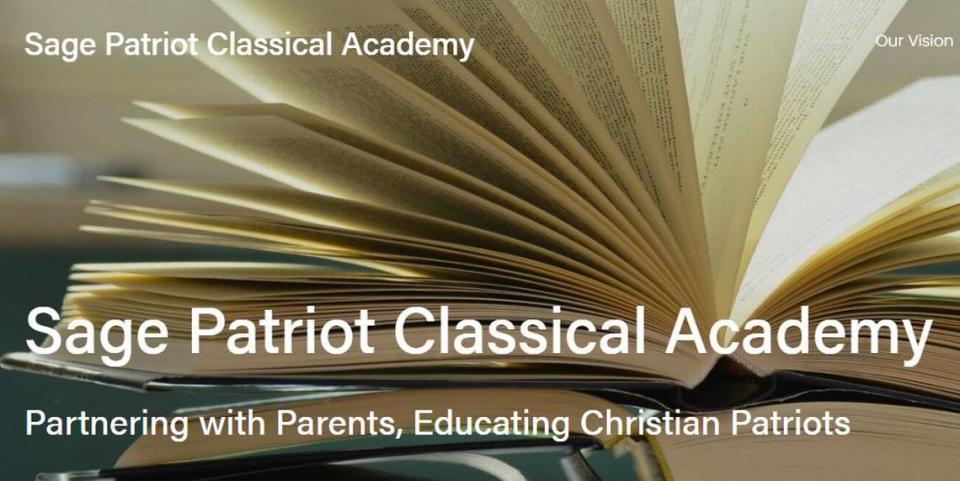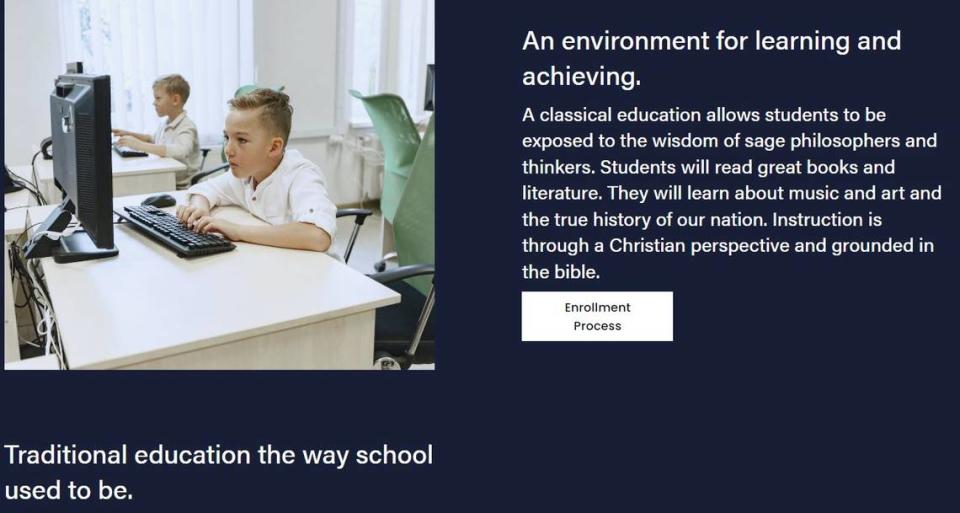Ousted Richland official, others to open private school to educate ‘Christian patriots’
A controversial Tri-Cities public official and a pair of banking executives plan to open a new private school this fall that aims to offer an education rooted in Christian patriotism.
Sage Patriot Classical Academy plans to serve K-5 students in a “traditional environment with rigorous classical academics and foundational morality. Students will “adhere to biblical principles” and the “Christian-Judeo philosophy,” according to its student application on the website.
Its board includes several executives who work at Gesa Credit Union and Columbia Industries, as well as Audra Byrd, the vice chair of the Richland School Board voted out of office in August.
Officials with the proposed school could not be reached by the Herald this week about their plans.
Sage Patriot Classical Academy
Sage Patriot Classical Academy bills itself as a “parent partnership” school.
It’s school philosophy includes a belief that “capitalism is the most effective economic system in the world” and that “our Founding Fathers envisioned a brilliant nation.”

“We believe in ‘love thy neighbor’ regardless of any real or perceived differences and we expect courteous behavior and civilized interaction always,” reads its school philosophy.
The school has registered as a nonprofit with the Washington Secretary of State’s Office, with a formation date of Dec. 7.
Annual tuition starts at $7,800 for the first child, or about $650 monthly. That’s low compared to other private schools in the area.
Founders say they are still in the process of acquiring a building and plan to be located in the Richland area. The school expects to operate on a four-day, weekly schedule.
There are very few requirements to operate private schools, and Washington state provides little oversight over instruction.
Teachers must hold a valid instructional certification, buildings must pass regular health and safety requirements, and schools must operate for a minimum of 180 days — but that’s about it.
Schools offering secondary education are required to self-certify that their curriculum meets the basic requirements for graduation, too.
“We’re not going to ask if they’re testing for the English state standards. We’re just going to look to see if they have four years of English,” said Randy Spaulding, executive director of the Washington State Board of Education.
Private schools must be approved by the state board, but the process for accreditation — which grants public recognition to schools that meet specific external standards of being quality — is optional.
Aside from those requirements, private schools mostly have full latitude to decide what to teach and how to conduct instruction.
Sage Patriot says it plans to use Hillsdale College’s 1776 Curriculum to teach students American civics and history. The curriculum — developed by the Michigan-based private Christian liberal arts college— is controversial among circles of educators and historians.
Critics say it is politically slanted and downplays the historical impacts of slavery and racism, while others say that that perspective is misunderstood and slavery and race shouldn’t be the guiding element of American history instruction.
Hillsdale offers its nearly 4,000-page curriculum online for free.

Private school alternatives
Private schools serve as alternatives to the traditional education model offered by public school districts, according to the Washington State Board of Education.
In the Tri-Cities, about 2,500 students are enrolled in private schools. Statewide, 80,000 students attend classes at some 550 private schools.
That’s about 10% of the total K-12 statewide student enrollment.
Students and families forgo the public school process for a variety of reasons, including for academic purposes or religious affiliation.
The mission of private schools can vary greatly, said Suzie Hanson, executive director of the Washington Federation of Independent Schools.
The Federation of Independent Schools serves as the “policy watchdog” for private schools. The organization works in Olympia to lobby and advocate for the interests of private school systems.
“It really depends on the way to mesh the family’s goals and beliefs with the school so that the student is supported in both their home life and school life,” Hanson said. “Sometimes students attend private schools because they’ve had lack of success in a public school. Sometimes it’s to continue with their community.”
After public schools closed during the height of the COVID-19 pandemic, many families turned to private schools to find a faster return to in-person learning.
Later, well after the pandemic subsided, many kept their students enrolled in private schools for variety of reasons.
Since then, Washington has seen one of the largest spikes in private school enrollment nationwide. Enrollment jumped 26% since the pandemic, according to KUOW.
“I think COVID definitely inspired people to want options,” Hanson said.
But, Hanson says, many new private schools face more hurdles starting up than they may anticipate.
“A lot of people want to start schools, and then they realize that it takes a lot more to open,” she said, adding later: “It’s a 24-hour-a-day job in the beginning.”
Gesa, Columbia Industries
The members serving on Sage Patriot’s board of directors have ties to a local-based credit union and conservative think tank.
Irina Galikeeva and Joan Wacker are high-level executives at Gesa Credit Union. Galikeeva serves as vice president of compliance, and Wacker is vice president of collections and loan servicing, according to a copy of the school’s student application.
Another board member, Kim Pierret, is the chief financial officer at Columbia Industries.
Eileen Griffin is a contributing editor at the Heartland Institute, a free-market, conservative think tank based in Arlington Heights, Ill., and the author of several books on politics and finance.
She also runs the local campaign consulting firm One Politician, which helped get two candidates elected to the Kennewick School Board this past election cycle.
Audra Byrd is a home school teacher and former Richland School Board member.
She and two other elected officials, Kari Williams and Semi Bird, were recalled by voters last summer for breaking state law and exceeding their authority after they voted to defy Gov. Jay Inslee’s indoor COVID mask mandate.
Even after facing intense scrutiny and a review by the Washington Supreme Court upholding the charges, the trio still stand by their actions. Bird is running for governor as a Republican in 2024.

